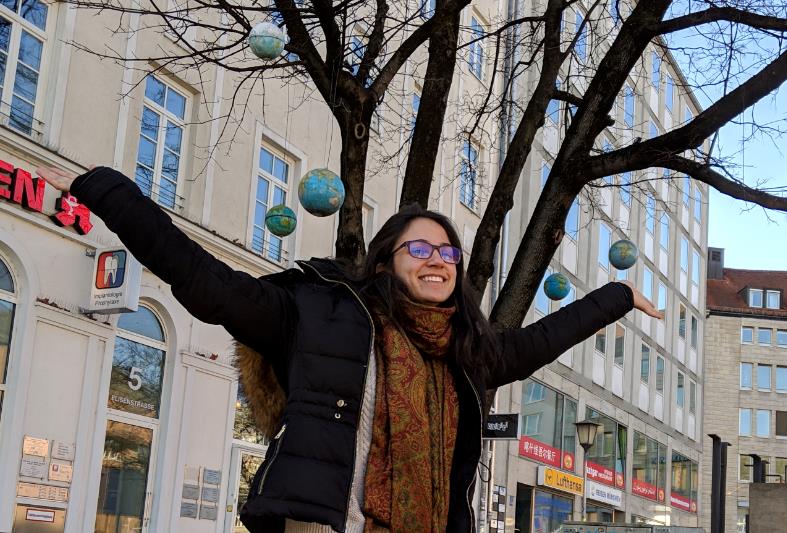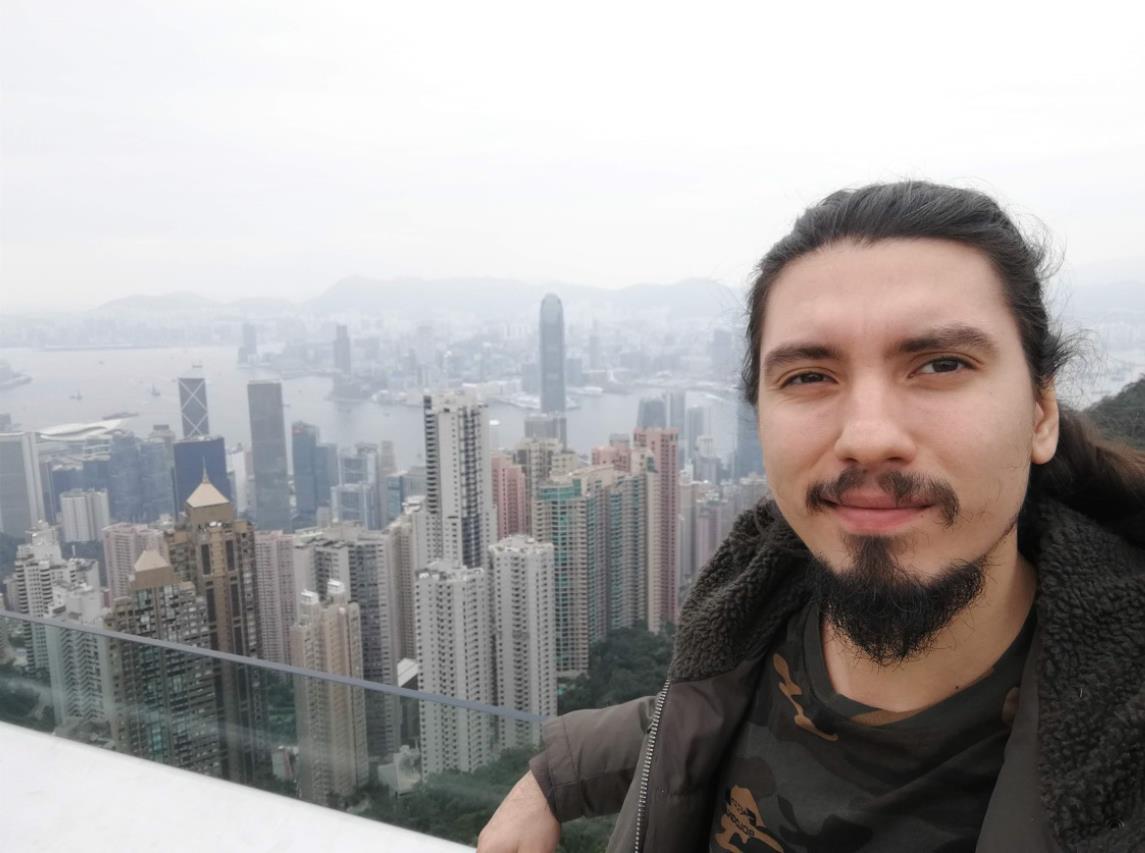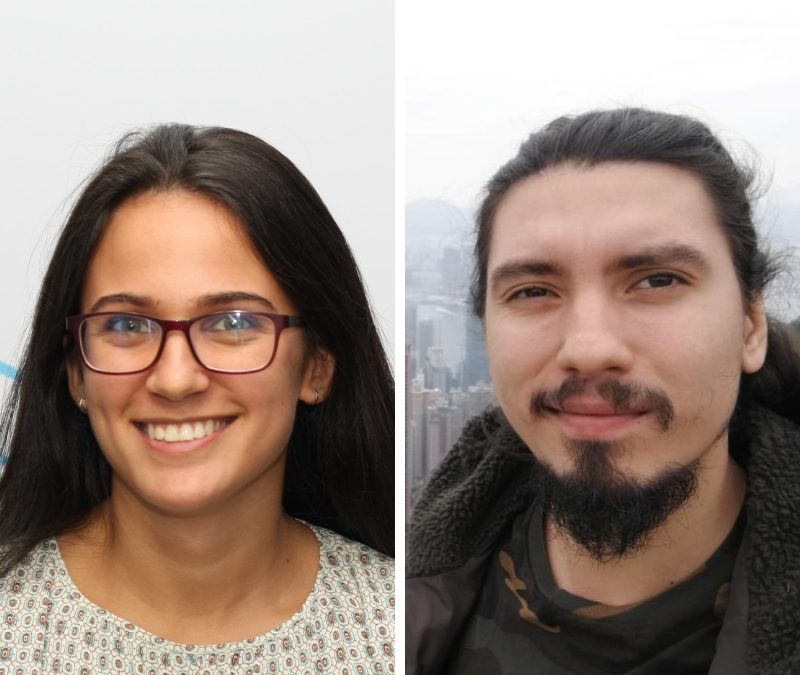
Andreea Sfia, Faculty of Aerospace Engineering, Air Navigation, Alumna 2018

Mihai Golu, Faculty of Aerospace Engineering, Air Navigation, Alumnus 2017
Last year we saw the Fulbright announcement on our website and we decided to apply for it; now we are very glad we did so because it turned out to be an exciting process.
“I remember how busy I was at the beginning of May in my last year of university: the thesis didn’t seem to write herself, many exams and courses… so I decided to leave everything aside for few days and focus on something completely different to clear my mind. That’s how I saw the Fulbright post and started the application. The essays I wrote were far from being perfect, because I just put my thoughts on a paper without correcting/improving/deleting/ask for feedback and all of that big fuss. This is not a suggestion to do like me though, make sure you present your best YOU in there” – Andreea Sfia
‘In 1958 Hannah Arendt discussed the issue of automation. In the Human Condition she defines the three types of activity: labor, work and action. The term of labor is related to raw work: digging the field, repetitive work like the one after the industrial revolution, ultimately, any activity which does not involve intellectual effort or incite a minimal one, primary being the physical activity. The work comes as a superior activity to labor where conceptualizing comes in, designs and implementing with the help of the intellect and putting everything into a final product: i.e. table, chair, and so on. In my opinion, every student of the Aerospace Engineering Faculty tends and is entitled to lean towards the third type of activity: action. This activity involves the ability to create connections, several activities through which an interconnection of various components from different domains is formed and functions. This requires interdisciplinarity. I now see that this is what our faculty is preparing us for, not to perform the same task after we have perfected it, not to be content with the examinations, but for continuing with the evolution, for that top of the lance about which we have been told since our first year. It is in our nature to evolve, and the incentive I received following the courses of the Aerospace Engineering faculty and listening to the teachers, even when we had to look beyond words, is the one that helps me perform with every new challenge I encounter, both in aviation and in everyday life.’ – Mihai Golu
The Fulbright Student Award is a competition for master’s study or research in the United States. Applicants should be Romanian graduates – BA (last year students), MA or PhD students – from accredited public and private universities. The Fulbright Student Award provides international travel, tuition and university fees within established budget limits, books and supplies allowance, accident/sickness insurance and a living stipend for one academic year. In short – there is absolutely no reason for you not to apply!
Applications are now open and you have time to complete the online application until the 7th of May 2019. Apart from the online application you will also have to submit 3 letters of recommendation – it is recommended to have them from both professors and professionals you worked with. After submitting those, Fulbright commission will decide if you get invited to an interview.
Four months after we submitted our applications we received the interview invitation, which took place in Bucharest in the second half of September. As we were both working away from home, we flew back home and get in the interview prepared to show them who we are and why should they send us to America! Well… or not so prepared. We didn’t really know what to expect from the interview, but everything went smoothly in the end. The interview was no longer than 15 minutes, at a round table facing 8 interviewers, both American and Romanian professors and professionals.
“15 minutes can pass so fast! I personally got the impression that I could have told them much much more, so the positive response took me by surprise.” – Andreea Sfia
At the beginning of October we received the “Congratulations, you passed the interview” which meant you’re going to study in America for one year! Of course this is not all, because it would have been too easy. Everyone that passed the interview had to take two exams: TOEFL and GRE (a standardized test including Math and English for any master in engineering).
In the same period we were asked to make a list of Universities and master programs we would like to apply for (we both made a list of 7, 8 programs). Then, together with the Fulbright commission, we had to decide on 4 programs where our application will be sent. The unexpected part was that we didn’t have to do anything else from this point; the International Institute of Education was to handle all the application process – so we waited.
Few days ago we got the responses from the universities. Our choices were Arizona State University, Embry Riddle, Florida University of Technology and Purdue University because they have good programs for Air Traffic Management and Human Factors (what we were interested in). We both got positive responses from all master programs, even some scholarships offered by the faculties. The Fulbright commission estimated our costs and it looks like the 40,000$ scholarship covers everything.
We still haven’t decided on the university, but wherever we end up we are sure that the experience will be an amazing one. In the USA universities start in August, so feel free to ask us for impressions after we get there.
When it comes to your future, there is never too much work or not enough time. Don’t stay too comfortable just because you are busy with writing your thesis of final exams, we all know you have time to write an essay and ask for some recommendations. Aviation is growing and many ‘problems’ appear together with that, so Aerospace/Aviation students will have an advantage in the competition because the industry wants us to be prepared!
In order to go for it, click here: http://www.fulbright.ro/news/605-fulbright-student-award-2020-2021
Our contacts: Andreea Sfia (andreea.sfia@gmai.com), Mihai Golu (mihaigolu@yahoo.com)
The Influence of Diesel Fuel on the Military Aviation Technology (Years 1985-1992)
These testimonials of my fellow avionics engineers regard the time span 1986-1992 and seem to be extracted from Zoshchenko. They are true stories of life of aviation engineers of that time, illustrating how high level engineering was done in a country, which...
Opportunities at ESA
Tomorrow's generation is a constant theme at ESA . Two new activities for students from all ESA member states (Romania is a full member from December 2011) are currently enrolling: Concurrent Engineering Challenge – deadline 27 July 2017 - "ESA’s Education Office is...
Rule Diploma Exam 2017
Correlation of the mark for knowledge in the Diploma Exam to the average grade of the years of study, according to Article 15, Paragraph 3 from the UPB Regulations to Finalize the studies is done by a rule issued by the Faculty Executive Board. The Faculty of...
Noble Jump 2017
Exercise NOBLE JUMP 2017 - NATO RF and VJTF took place at Cincu, in Romania. More than 4,000 troops have been involved (out of which 2,000 dispatched to Romania within days) from US, UK, Norway, the Netherlands, Poland, Spain and Albania. The fictitious scenario...
Airbus Safran Launchers Prize 2017
On 8 June 2017 at the Air and Space Museum of Paris Le Bourget, the students of the Faculty of Aerospace Engineering gathered in the Space Piranhas team have won the prestigious Airbus Safran Launchers Prize, awarded by the European Astronautic Club, with support from...
News Diploma / Dissertation
News on ending of studies have just been published on site, of interest for the 4th Year Bachelor and 2nd Year Master students. Read the news on Diploma Projects / Exams <here> Read the news on Dissertations / Dissertation Exams <here> Caution, the UPB...
Iosif Șilimon
”85 years back, on 22 July 1918, an outstanding man was born, who passed away on 8 February 1981, but will live in our memory and in the history of the Romanian aviation through the creation of the IS gliders. After graduation in 1941 of the Aviation Section of...
CFP Big Data from Space
Please note three Calls For Papers on Big Data from Space, kindly provided by Prof. Mihai Datcu (DLR): 2017 Conference on Big Data from Space (BiDS'17) Research, Technology and Innovation 28-30 November 2017 Centre de Congrès Pierre Baudis, Toulouse, France...
Introduction to Aerospace Engineering
The book was written in 2009 by Associate Professor Dr. Octavian Thor Pleter. It is written for the future aerospace engineers, in an attempt to capture both the complexity and the fascination of this cutting edge profession, in a holistic, multidisciplinary...
Antonio Licu
Eng. Antonio Licu Eng. Antonio Licu is the leader of AirNav Board, a Think Tank consisting of high graduates of the University Politehnica of Bucharest, Faculty of Aerospace Engineering, personalities of the field, professionally established in international...


0 Comments